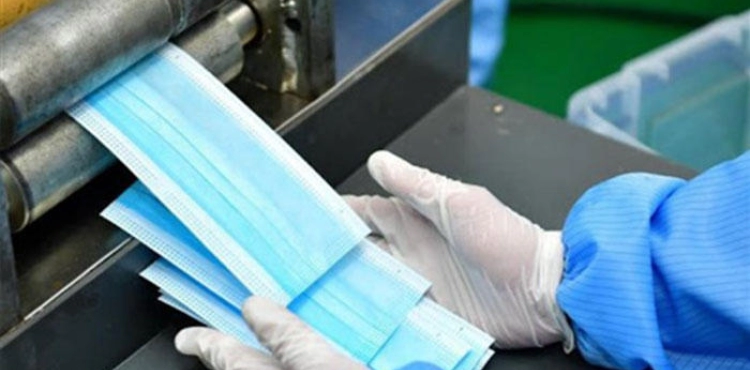More than 60 workers at the factory of the businessman Hassan Shehata, in Gaza, are busy behind sewing machines to sew and equip protective masks to protect from the outbreak of the new Corona virus, at a time when this type of products is most needed in the world.
The factory is preparing to produce more than a million muzzle for export to the United States of America in light of the outbreak of the virus, after contracting with a number of Palestinian businessmen present in it.
"Despite all the difficult political circumstances surrounding us, we have been able to gain a good reputation in the quality of our work," 50-year-old Shehata told Xinhua, as blue masks and protective medical clothing are stacked on the floor.
Until recently, the Shehata factory used to export its clothing products to Israeli and local companies and markets, but today it is receiving a flood of orders from other countries.
Shehata adds that Gaza was able to "compete with its industry for medical silos in the markets, despite the limited resources and capabilities it has."
The owner of the factory considers that the Corona virus crisis opened the horizons for the besieged sector, despite the existence of political differences.
Shehata points out that the humanitarian situation is stronger than politics and its complications, especially since the virus threatens everyone without distinguishing between anyone, pointing out that the Corona crisis contributed greatly to "dealing with everyone in a purely humanitarian framework."
He explains that "the interest is mutual, for the Israelis and the Americans want to obtain medical protective masks, and we need to employ the largest possible number of workers to alleviate the difficult economic conditions in the sector."
He says, "The American administration stood against the Palestinians in their case, but we cannot stop helping others who need to intensify efforts to fight this virus."
For a whole month, the factory worked to supply its products to the Israeli market, which contributed to providing job opportunities for hundreds of workers after stopping for a long time, according to Shehata.
The factory produces approximately 50,000 masks daily for Israeli companies.
Shehata says that the Gaza factories managed to meet the great need for muzzles by Israel to limit the spread of the virus, pointing out that commercial activity is witnessing a remarkable activity between the two sides.
Business stopped completely between the Gaza Strip and Israel after the latter imposed a tight blockade on the sector after the Islamic Resistance Movement (Hamas) seized it by force in 2007.
Ibrahim Muhammad, 40, hopes that the productive factories in Gaza will remain operational and that trade between the Palestinian and Israeli sides will be revived as before.
Mohamed, who has been working on dressmaking for 20 years, says: "The work over the past years has been intermittent according to requests only, and it has not been as continuous as we wanted."
"Now we are witnessing a recovery, especially since the number of working hours has increased more than before, which positively affects our daily wages," Muhammad Al-Abed adds to seven children.
Israeli merchants usually send straws to Gaza through the only commercial Kerem Shalom crossing in the southern Gaza Strip, in order to manufacture medical masks.
Shehata expressed his fear that his factory would stop working if the cloth was not provided by Israeli merchants in the coming days, after European countries prepared to send shipments of masks to Israel.
Palestinian statistics indicate that the number of factories and establishments destroyed by Israel in the sector or that have stopped as a result of the blockade exceeds four thousand economic establishments, while the number of unemployed exceeds 255 thousand.
According to statistics, direct and indirect losses exceed $ 1 billion annually, and if the blockade continues, an economic catastrophe will afflict the Palestinian economy.
The media official in the Gaza Chamber of Commerce and Industry, Maher Al-Tabaa, considered that the export of factories in Gaza "is an important step that reflects the ability of the Palestinians in Gaza to adapt and compete in foreign markets."
Al-Tabbaa says that the export of factories in Gaza from their products, such as masks and protective clothing, abroad is working to partially amend the trade balance because it suffers from a large deficit, where imports are many and exports are few, calling on the Ministry of Economy in Gaza to support and encourage the industrial sector.
The economist, Yasser Al-Alam, believes that the increase in the pace of trade between Israel and Gaza in light of the Corona crisis is limited to only one sector, which is the sewing sector, in the interest of Israel only.
The scientist says that "a limited recovery is only in the interest of factory owners, but if we want to compare it in the sector´s general economy, it will get zero."
Despite this, the world does not believe that the trade between Israel and the Gaza Strip will change or improve after Corona, despite the fact that all trade agreements will change among all countries of the world, as he put it.












